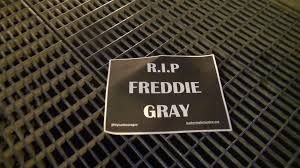Lawson: The value of life

Courtesy of Wikimeadia Commons
The verdict for Freddie Gray’s wrongful death suit will offer 6.4 million dollars to his family for his death in police custody. Columnist Lawson believes that there should be a set formula to determine how much compensation a family should receive from a wrongful death suit.
September 12, 2015
When a life ends too soon because an unjust act of violence, no restitution for the surviving members of that family exists. But they do have the opportunity to claim the societal loss of their loved one in a wrongful death suit. Wrongful death suits are filed when a life has been lost because of an act of negligence.
In the case of Freddie Gray, his family was recently awarded a $6.4 million settlement from the city of Baltimore. Gray died April 19, 2015 after he incurred a severe spinal injury while he was in police custody.
There has been an outcry by some that the settlement number was ‘obscene’ for being so high. Settlements vary person to person and it depends on the circumstances surrounding the death. The general “formula” for a settlement is an estimated value of your earning and potential and what was lost when the life was ended.
This raises the question of what is the value of your life, and can you really put a price tag on someone’s existence?
What factors do courts have to take into consideration when deciding on a final amount?
The courts are having to make an estimate on the value that society has lost from the wrongful death of an individual. There is no formula for this and no right or wrong answer. There is no evaluation by a governing body or any set guidelines.
The laws based on what can be considered, and in what situations the life in question was ended, vary state to state, so there are inconsistencies when it comes to judgments and settlements that have been awarded.
The city of Baltimore has paid $5.7 million from 2011 to 2014 in wrongful death suits. During a three-year time period, Baltimore has paid less to several families than it is paying to the Gray family, which is set to receive $6.4 million.
This causes elevated concern. The question is not “what is the value of a life?” but “how do you, as governing body, say that one life is worth $6.4 million, and several people were worth a collective $5.7 million?” The main difference that I can see is that one of these cases received media attention, while several others went unaddressed.
The public may never know why or how the Gray settlement was reached because it was decided outside of court, so the exact breakdown of the award may not be available.
The media attention that Gray’s death received on a national level created a bias within the courts and the city. One settlement outnumbered the amount of settlement issued during a three-year time span. Baltimore has been under fire since Gray’s death and it is believed that the judgment was influenced because of the media attention.
If judgments are suppose to be based on the deceased person’s per-death pain and suffering, the medical costs that the deceased victim incurred as a result of the injury prior to death — funeral and burial costs, loss of the deceased person’s expected income, loss of any inheritance as a result of the death, value of the services that the deceased would have provided, loss of care, guidance and nurturing that the deceased would have provided, loss of love and companionship and loss of consortium — I do not see how one person’s value is $6.4 million and there are three years of settlements that do not equal close to that amount.
The media played a role in this judgment, and bias was created with this case. When no limits and no secure laws to guard over cases like Freddie Gray’s exist, it becomes a different act of injustice.
No one knows the background of the other cases that were filed and those lives were never publicized. Those families were put at a lower priority on the pay scale.
But there is a solution to this injustice.
There has to be concrete laws for these types of cases. What can be claimed and what can be awarded has to be concrete and adopted by every state to ensure that the settlements fit the crime they are being awarded to.
This task is a huge undertaking, but it is needed to reach equality. No grey area as to what monetary assistance is acceptable should exist when a life is lost.
















